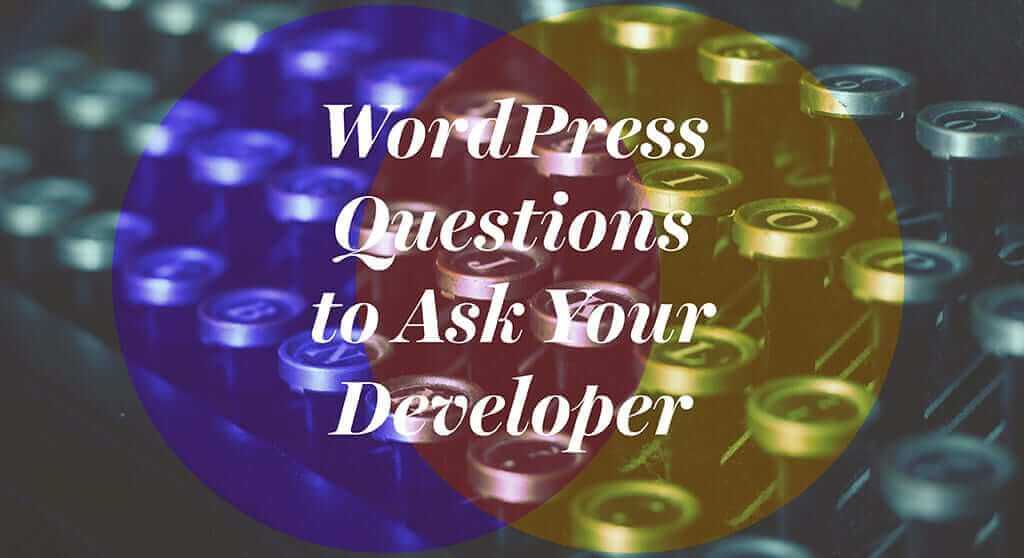If I’ve learned one thing from our involvement in the WordPress community it’s that everyone uses it differently.
On one hand this is awesome because no matter what you’re trying to do, it’s likely that someone else has tried to do the same thing and has shared their successes and failures online. On the other hand, from a customer or user’s perspective WordPress is like a box of chocolates, you never know what you’re going to get, and you won’t find out what flavor it is until you’ve already taken a bit bite and started chewing.
Then you find out if you got a delicious salted caramel nougat, or a nest of fire ants.
First of all, why WordPress?
Everyone will have their own reason for this, but here are our answers:
WordPress provides a common foundation for custom development work that makes it more portable and agnostic. Meaning that even in extremely custom feature development, there’s still some common components that can be communicated between developers in a language that makes sense.
As the CMS with the largest global marketshare (60% of all CMS driven sites, and 30% of all sites, period) there are an overabundance of resources available. This abundance has created a diverse and nuanced economy with niches carved out for businesses of every shape and size, solving all kinds of interesting problems.
Market dominance comes with increasing recognition, familiarity, and demand. Since becoming WordPress exclusive in 2009, I’ve seen it change from being something we have to sell people on using, to something most clients request by name. This is a great business advantage, but it’s also a double edged sword because WordPress’ ubiquity also means even more competition.
WordPress is comfortable, but comfort is the enemy of innovation.
In our experience one of the primary draws of WordPress is that it’s comfortable– meaning the paths you tread are well worn, and there are innumerable resources out there in a supportive community. It is entirely possible (and more common than not) to build an agency on making WordPress sites with only passing knowledge of the inner workings of the platform, and even less knowledge of how it fits into the larger world of internet software. With large, well developed plugins for just about anything you could possibly want to do (as long as you do it their way), or entire frameworks that sit on top of WordPress built with the express purpose of saving you from the scary world of code, just about anyone can do it.
And with more and more users relying on that level of hands-free comfort it disincentivizes innovation, certainly on their part where they are incapable of contributing to it, and encourages the platform developers to continue to cater to the same patterns of use.
If you feel comfortable in where you’re at, you’ve stopped innovating and you’re about to get lapped.
Joe Ouillette – Lead Dev
It’s important to note that this is not a weakness in WordPress as a platform, and in most cases it’s an overwhelming positive. But when innovation and leading the pack is your mission there are plenty of side roads that can distract even the most stalwart among us.
The true drawback of this panoply of comfort affects the clients: it turns shopping for a WordPress contractor/agency into a game of high stakes Minesweeper.
How to win high stakes Minesweeper or What degree of expertise do I need in a WordPress developer?
If WordPress’ low barrier to entry is both an asset and a liability, how can I make the best decision for my business when shopping my project around? I’m glad you asked! Here are some webmaster personas along with key questions to ask each one:
Mike – Oldschool Developer Trying to Stay Current
- How long have you been using WordPress?
General coding experience does not equal WordPress or website build proficiency. - What is your communication plan / how will you keep us updated throughout the project?
With contracted developers communication is a key weak point, they need to have a good process in place. - Do you custom develop your themes/plugins or use off the shelf? Which ones?
Working solo, they probably rely on more off the shelf solutions, and if they haven’t been working in WordPress long, they might not be using great ones.
Deborah – Oldschool Graphic Designer Making Simple Sites
- What do you use for website security?
If they are non-technical person selling websites, you need to be extra cautious that they at least know how to protect your site. - Which page builder do you use?
There is a 100% chance they are using an off the shelf page builder plugin to build out your site, if you learn which one ahead of time you can research it and look at reviews, how-to videos, etc. - Do you have a developer you partner with to handle things beyond your skill?
All of the plugins in the world can’t save you from having to get your hands into the code, so make sure they have someone on call that can patch things up should you encounter any odd issues.
Stephen – Freelance Developer
- Do you have a portfolio of launched sites?
Longevity and track record are key things to investigate here, and this is the easiest place to start. - How will you keep us updated throughout the project?
As with oldschool developer Mike, Stephen also needs to impress you with his communication skills. - How many other projects do you have going on right now?
Freelance developer churn and burn is a time honored tradition- make sure you’re not the project he burns out on and leaves unfinished by checking his overall bandwidth for new projects.
Jack and/or Jill – Agency Rep
- Do you custom develop your themes/plugins or use off the shelf?
If you’re investing in agency work you really want to make sure they have the proficiency to provide agency level service. - Do you use a page builder or custom templates/content management?
The sad truth is that more and more agencies are using page builders instead of custom design. They offer the illusion of freedom and are usually an economical choice, but bely a lack of development skill. Proceed with caution. - Are you developers in-house or contracted?
You’d be surprised how many shops run by non-technical folks outsource their development. This is a red flag. - What is your project management process?
They ought to be able to easily answer this question to your satisfaction, if not, that’s a red flag.
All of the Above
- Always ask for references, and follow up with them
Everyone puts their best foot forward at the beginning of a project, but what about when things get complicated? - Who is hosting my website? Where will that be?
As long as the answer isn’t “On my personal server”, this should be okay. - What is your process for executing a project?
If they can’t immediately outline the process clearly for you, this is a bad sign.
How do we set ourselves apart?
In a tech town like Ann Arbor you can’t get five steps from your front door without bumping into a baker’s dozen self-professed WordPress Guru’s: from old school ASP developers trying to stay relevant, to young self taught coders looking for a break, to boomers who rely on WordPress’ ease of use, breadth of tools, and community support to buoy a secondary career as mom & pop webmasters. With that kind of the market saturation, how in the world do you set yourself apart?
We put our blinders on, keep our eyes fixed on the finish line, and run hard.
If you’re too busy watching what your competitors are doing, you will lose sight the finish line and your goals will become imitation oriented, it’s that simple. Stagnation is what happens when you stop looking forward to what’s just over the horizon. By being laser focused on creating solutions tailored to each client’s needs, evolution happens naturally.
We’re not looking at what everyone else is doing or at canned solutions, we’re looking at what is the best solution in this moment, for this unique business.

